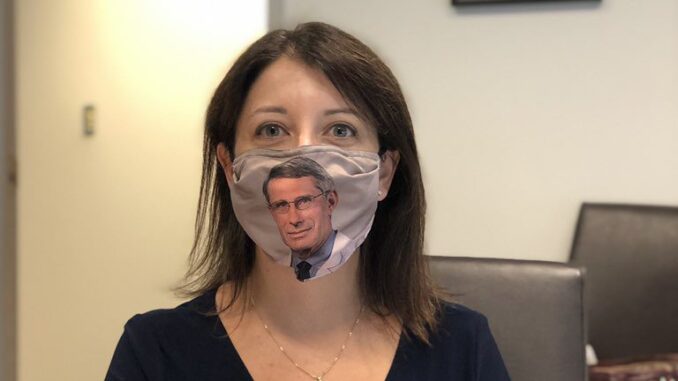
RALEIGH — Former N.C. Department Health and Human Services Secretary Dr. Mandy Cohen and Aledade, the company she now leads as CEO, had no comment on a report by The Washington Post that President Joe Biden is tapping Cohen to replace outgoing CDC Director Rochelle Walensky.
Walensky tendered her resignation in early May, saying the “waning of the COVID-19 pandemic was a good time to make a transition,” according to The Associated Press. Her last day is June 30.
Cohen obtained her medical degree from Yale University School of Medicine in 2005 and received her license in 2007. However, records show she only practiced for a couple of years and her medical license lapsed in 2012. She also has a bachelor’s degree from Cornell University (2000) in policy analysis and management and a master’s degree from Harvard University School of Public Health (2004) in health administration.
Cohen, who became a fixture in near-daily virtual press briefings during the COVID-19 pandemic in 2020, had been working in the private sector for Aledade since departing the agency in late 2021.
North State Journal had emailed Aledade’s press office and Cohen for comment on the story. After the email to Cohen was returned with a message stating “Message bounced due to organizational settings,” a response was received from a third party, Crosscut Strategies. That organization describes itself as a “strategic communications firm helping venture-backed startups, Fortune 500 companies, and mission-driven visionaries grow, thrive, and succeed.”
“Neither the company nor Dr. Cohen have a comment,” Ken Baer, CEO and co-founder of Crosscut Strategies, wrote in an email response to North State Journal.
Since her name was floated by The Washington Post for the CDC post, critics have begun reviving past and recent information about Cohen.
One example is a video clip of an interview Cohen gave on May 31, 2022, to Duke professor David Ridley where she discusses how she came up with COVID-19 mandates for North Carolina. Her remarks don’t mention “following the science” but instead conferring with other states on what they were doing.
“She was like, ‘Are you gonna let them have professional football?’ And I was like, ‘No,” said Cohen about shutting down sports events. “And she’s like, ‘OK neither are we.’”
Another example is a tweet issued by Cohen on Aug. 13, 2020, for “world mask week” in which she includes a photo of herself wearing a mask with Dr. Anthony Fauci’s face on it.
WBT radio host Pete Kaliner also tweeted a moment from 2020 of the former NCDHHS secretary. The tweet contains a series of images taken from a video clip of a press briefing where she appeared to be pretending to wearing a mask for the benefit of the cameras.
Cohen was named as secretary of N.C. Health and Human Services (NCDHHS) by Democratic Gov. Roy Cooper in early January 2017 following his election to his first term as governor in 2016.
Cooper has yet to issue a statement on Cohen being Biden’s possible pick to lead the CDC.
When Cooper picked Cohen, she was the outgoing chief operating officer and chief of staff at the Centers for Medicare and Medicaid Services (CMS).
While at CMS, Cohen was also a principal deputy director of the Center for Consumer Information and Insurance Oversight. She had also been a senior adviser involved in Affordable Care Act implementation activities under the Obama administration.
From March 2020 on, Cohen would find herself at the center of school closings, mask fights, nursing home issues and lawsuits related to business closures, as well as lagging data and vaccination rates.
Within the past year, information has come to light showing national teachers’ unions had significant influence over the CDC’s COVID-19 guidance for schools, in particular the reopening of schools to in-person instruction. In just the past few weeks, a Congressional hearing revealed that American Federation of Teachers President Randi Weinstein had the direct number for Walensky.
Additional news stories have fueled public mistrust in federal agencies like the CDC, including the now-documented suppression of alternate COVID-19 viewpoints on social media platforms by government entities.
North Carolina K-12 schools relied almost exclusively on Cohen’s schools toolkit, which in turn drew its guidance from the CDC. The North Carolina toolkit was used to keep schools closed to in-person instruction and keep school children masked well into the first quarter of 2022.
As early as June 2020, concerns arose over whether or not children would be forced to wear a mask upon returning to school.
Guidance issued in April and May 2020 by the World Health Organization said that masks were unnecessary for healthy people. Meanwhile, the CDC guidance for schools stated, “Cloth face coverings are meant to protect other people in case the wearer is unknowingly infected but does not have symptoms.”
The CDC’s position was echoed by Cohen during an April 2, 2020, briefing in which she said, “Face masks are really protecting the world from the person wearing the mask, not the other way around.”
By June, however, Cohen had reversed course, stating in several briefings that the public should “mask up,” and the NCDHHS website was altered to state “Covering your face is about helping others” and showing that “you are being a good neighbor and community member.”
When the coronavirus hit North Carolina in 2020 and Cooper announced his statewide stay-at-home orders, one of the first groups affected were public school students. At that time, no one knew when schools would fully reopen, and that uncertainty was underscored later that year at a May COVID-19 legislative meeting featuring officials from NCDHHS.
NCDHHS had a “very high sense of urgency” about providing clarity about just when schools will reopen, according to statements made by state Sen. Jim Perry (R-Lenoir) to North State Journal following the meeting. When asked about a specific timeline, Perry said, “That’s the million-dollar question.”
The million-dollar question would remain unanswered and the state’s K-12 school children would remain in limbo well into the 2021-22 school year with Cooper’s indecisive application of “hybrid” in-person and remote instruction combination plans in which he left decision-making up to the state’s 115 public school districts. The hybrid plans, as part of the state’s toolkit, once again drew from CDC guidance.
Before the 2020-21 school year was out, districts had begun to rebel, and by the fall of the following school year, Cohen had issued a legal threat to Union County’s school board after that body issued a motion on Sept. 13 to drop contact tracing and quarantine procedures.
Undeterred, Union County’s school board voted 8-1 to approve a resolution calling for the state to end contact tracing and quarantining of K-12 students on or before Jan. 19, 2022. The resolution called attention to the two processes negatively impacting student mental health and learning outcomes.
On Feb. 10, 2022, House Speaker Tim Moore (R-Kings Mountain) called on the governor to end K-12 masking and quarantine orders and policies. Cooper refused.
The CDC’s “Test to Stay” protocol is implemented by NCDHHS in January 2022. Under that protocol, students who are out sick or are sent home for any reason were allowed to take a COVID-19 rapid test to determine if they could return to class. A month later, documents showed that the Duke ABC Science Collaborative and NCDHHS had already been engaged on the topic of Test to Stay.
Despite pressure from parents and the legislature, the NC K-12 toolkit update kept masking in place but altered some quarantine and contact tracing requirements.
Lawmakers pushed back on the masking remaining in place with legislation called the Free the Smiles Act. Cooper vetoed the bill and Senate Democrats voted to uphold the veto.
Responding to a question from a media outlet during a Feb. 17, 2022, briefing, Cooper characterized the General Assembly’s bill to allow parents to choose whether or not their child is masked as “frantic” and said he thought local control by school districts was “important.”
At the time of the Feb. 17 briefing, 60 of the state’s 115 school districts were done waiting and had already passed policies to make masks optional.
Cohen’s K-12 toolkit remained in place well after she departed NCDHHS. Near the end of the 2021-22 school year, the agency quietly issued a memo sunsetting the guidance effective June 23, 2022.
The CDC, various state and federal agencies, as well as both Cooper and Cohen have faced criticism for their COVID-19 policies, with critics pointing to dramatic school achievement score drops and learning loss as well as continued growing school violence and increased mental health issues.



